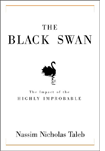
Tyler Cowen has a nice review in Slate (actually, a slice & summation) of Nassim Nicholas Taleb's most recent book, The Black Swan: The Impact of the Highly Improbable. Taleb's discursive and meandering narrative delves mostly into the domains of economics, statistics and psychology, so Cowen is in a good place to tackle his argument. Myself, I was intrigued by the jeremiad against the Gaussian and Poisson distributions. Like Michael Stastny I think Taleb goes a bit too far. Nevertheless, I have to wonder about the fact that though we model characteristics like IQ as a bell curved Gassian distribution, the tails are invariably fat. That is, beyond 2 or 3 standard deviations above or below the norm there start to be many more individual as an empirical matter who exhibit a particular value then the distribution would predict. One might make the case that in those north of 3 standard deviations are particularly important in shaping the path which our species takes through history. In evolutionary biology R.A. Fisher long promoted a gradualist paradigm predicated on the substitution of alleles of small effect which resulted in minimal deviation of a character's central tendency over a short period of time, but, as I have noted recent work implies that a large role maybe played by mutations of large effect. Veritable genetic "Black Swans." The eminent evolutionary geneticist James F. Crow told me last year that "...Nature seems to follow least-squares principles." Taleb would surely beg to differ, and no doubt emphasize the ubiquity of non-linearity and the enormous biological import of the rare anomalous deviation from the regression line.













